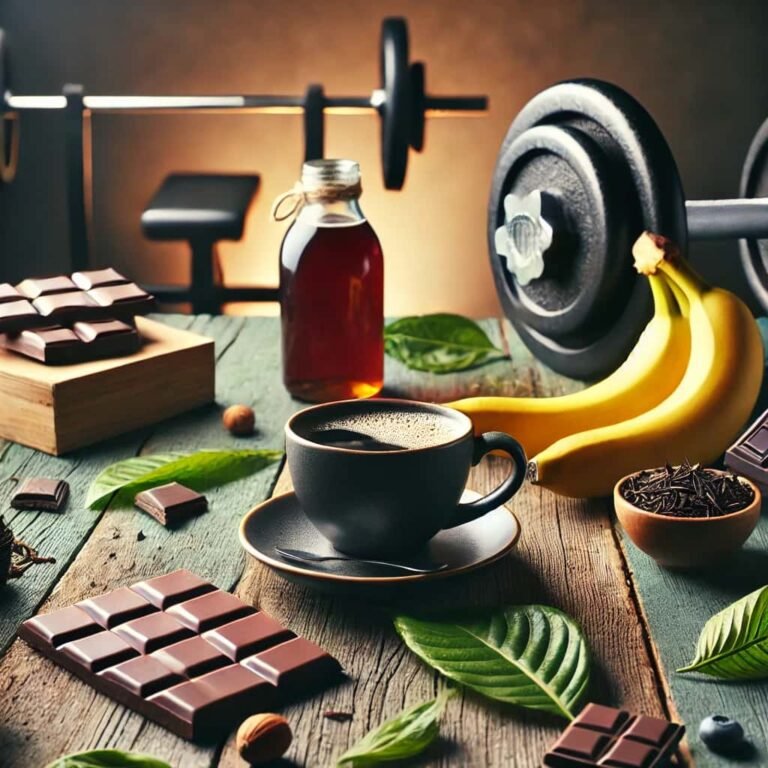

Have you ever wondered if that energy drink you consume before working out gives you more strength or focus than coffee or a caffeine capsule? In this blog, we’ll explore recent studies on the real benefits of energy drinks and how their additional ingredients could impact your performance and health.
The Star Player: Caffeine
Caffeine is undoubtedly the star ingredient in many energy drinks and pre-workout supplements. Found naturally in coffee, tea, and cocoa, it’s known for its stimulating effects: boosting focus, enhancing alertness, and, in sports, improving endurance and strength.
According to recent studies, both energy drinks and caffeine supplements enhance physical and cognitive performance. However, the key takeaway is that caffeine alone is enough to reap most of these benefits. For example:
- In a study with 21 active participants, consuming an energy drink and an equivalent dose of pure caffeine (200 mg) showed no significant differences in strength tests (such as bench press or grip strength), mood, or sustained attention.
- Another study found that pure caffeine was more effective and economical than a multi-ingredient supplement in increasing total bench press repetitions.
What About the Extra Ingredients?
Energy drinks contain more than just caffeine: L-theanine, which promises synergy with caffeine to improve focus; L-tyrosine, taurine, and B vitamins, all said to enhance focus and energy. However, scientific evidence is mixed:
- Some ingredients, like L-theanine, show benefits at specific doses that are not always present in energy drinks.
- Others, like taurine, might counteract caffeine’s cardiovascular effects, though this is not fully clear.
- In practice, these additional ingredients don’t always provide significant improvements and, in some cases, may pose risks.
Additionally, multi-ingredient supplements (MIPS), including energy drinks, are significantly more expensive and less effective than pure caffeine.
The Risks of Artificial Ingredients
Consuming energy drinks excessively not only costs more but also exposes you to potential risks:
- Unknown side effects: Additional ingredients can interact with each other or with caffeine, diminishing their effectiveness or causing unwanted effects.
- Sugars and additives: While many versions are low-calorie, others are packed with sugar and artificial additives that offer no health or performance benefits.
The Natural Alternative: Back to Basics
Why complicate things with chemical-laden drinks when natural options are readily available? Here are some great choices:
- Black coffee: Simple, affordable, and effective. A cup contains 80-120 mg of caffeine, enough to boost performance without questionable additives.
- Green tea or matcha: These provide moderate caffeine and antioxidants for sustained energy without sudden crashes.
- Dark chocolate: Contains theobromine and small amounts of caffeine for a gentle boost.
- Fruits like bananas and dates: While they are caffeine-free, they are excellent sources of quick energy before workouts.
Conclusion: Less Is More
If you want to maximize your performance, evidence suggests that pure caffeine is more than enough. Energy drinks and multi-ingredient supplements are not only pricier but their additional benefits are marginal or nonexistent. Moreover, by choosing natural options like coffee or tea, you reduce unnecessary risks and promote healthier nutrition.
The next time you prepare to work out, ask yourself: do you really need that energy drink? Perhaps a well-brewed cup of coffee is all your body and wallet require.
What’s Your Take?
Do you prefer energy drinks, supplements, or natural options? Share your experience in the comments!
References
- Pereira F, Evans C, Rojas J, Curtis J, Andal A, Thakkar H, et al. Beyond the Buzz: Do Energy Drinks Offer More Than Caffeine for Mental and Physical Tasks? Int J Exerc Sci. 2024;17(2):1208-18.
- Kruszewski M, Merchelski M, Kruszewski A, Tabęcki R, Aksenov MO, Pągowski Ł. Effects of Multi-Ingredient Pre-Workout Supplement and Caffeine on Bench Press Performance: A Single-Blind Cross-Over Study. Nutrients. 2022;14(1750). Available from: https://doi.org/10.3390/nu14091750
